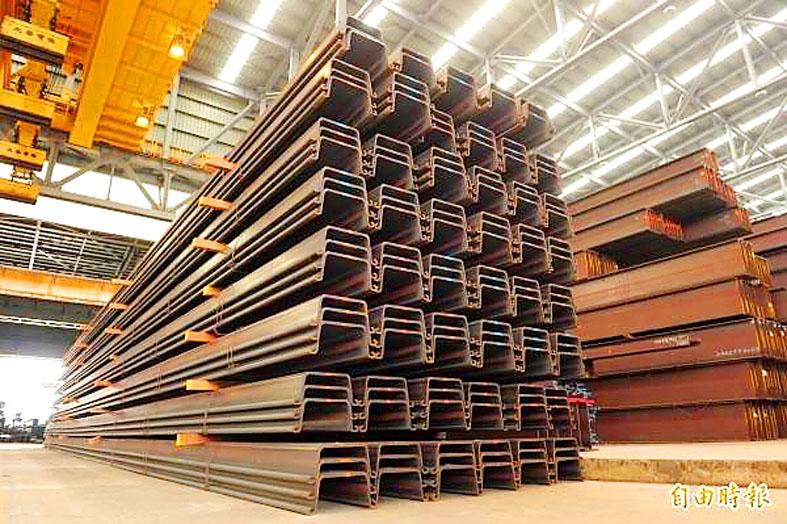China Steel Corp (CSC, 中鋼), the nation’s biggest steelmaker, yesterday said that it would raise prices by 1.7 percent for next month's deliveries to reflect rising raw material costs.
The Kaohsiung-based firm said it would also increase prices for next quarter's deliveries by 8.3 percent, as market demand remains strong and production cost continues to rise.
CSC updates prices for products such as hot-rolled steel on a monthly basis to reflect market conditions, it said.

Photo: Lin Ching-hua, Taipei Times
The company updates prices for other products, such as automotive steel, on a quarterly basis, it added.
“Our principle is to set prices that are steady, gentle, opportune and balanced,” the company said in a news release. “We have taken the competitiveness of the steel industry, the cost of raw materials and price pressure on steel companies into account.”
CSC said that it anticipates strong demand ahead.
“The signs of a global recovery in manufacturing are clear,” it said. “Demand for automobiles, infrastructure projects and home appliances is rapidly increasing.”
“The World Steel Association predicts an increase of 4 percent in global steel demand this year,” CSC said.
On the demand side, companies have been slow to restore capacity to what it was prior to the COVID-19 pandemic.
“On the supply side, due to the impact of COVID-19 and extreme weather, some blast furnaces in Asia and Europe have been slow to return to production,” CSC said. “Together with disruptions in logistics, we have seen major delays.”
Downstream Taiwanese steel inventory “has reached the lowest point in years,” it said.
CSC cited high costs of raw materials, such as iron ore, scrap steel and smelting materials, for its increase of average steel prices.
“The cost of iron ore reached US$178 per tonne at one point,” the company said. “This is not too far from the all-time high of US$194.”
“Globally, steel companies are continuing to absorb the pressure of high raw material costs,” it said. “Going into the traditional strong season of the second quarter, there is clearly space for steel products that are priced each quarter to become more expensive, especially in cases where prices have fallen far behind monthly-priced products.”
Monthly-priced hot-rolled steel and cold-rolled steel are to rise NT$450 per tonne each, while electromagnetic coils are to go up in a range from NT$600 to NT$1,200 per tonne, CSC said.
For quarterly priced products, steel boards are to rise NT$2,500 per tonne, hot-rolled high-carbon steel by NT$2,800 per tonne and automotive steel by NT$2,800 per tonne, it said.

TECH BOOST: New TSMC wafer fabs in Arizona are to dramatically improve US advanced chip production, a report by market research firm TrendForce said With Taiwan Semiconductor Manufacturing Co (TSMC, 台積電) pouring large funds into Arizona, the US is expected to see an improvement in its status to become the second-largest maker of advanced semiconductors in 2027, Taipei-based market researcher TrendForce Corp (集邦科技) said in a report last week. TrendForce estimates the US would account for a 21 percent share in the global advanced integrated circuit (IC) production market by 2027, sharply up from the current 9 percent, as TSMC is investing US$65 billion to build three wafer fabs in Arizona, the report said. TrendForce defined the advanced chipmaking processes as the 7-nanometer process or more

China’s Huawei Technologies Co (華為) plans to start mass-producing its most advanced artificial intelligence (AI) chip in the first quarter of next year, even as it struggles to make enough chips due to US restrictions, two people familiar with the matter said. The telecoms conglomerate has sent samples of the Ascend 910C — its newest chip, meant to rival those made by US chipmaker Nvidia Corp — to some technology firms and started taking orders, the sources told Reuters. The 910C is being made by top Chinese contract chipmaker Semiconductor Manufacturing International Corp (SMIC, 中芯) on its N+2 process, but a lack

NVIDIA PLATFORM: Hon Hai’s Mexican facility is to begin production early next year and a Taiwan site is to enter production next month, Nvidia wrote on its blog Hon Hai Precision Industry Co (鴻海精密), the world’s biggest electronics manufacturer, yesterday said it is expanding production capacity of artificial intelligence (AI) servers based on Nvidia Corp’s Blackwell chips in Taiwan, the US and Mexico to cope with rising demand. Hon Hai’s new AI-enabled factories are to use Nvidia’s Omnivores platform to create 3D digital twins to plan and simulate automated production lines at a factory in Hsinchu, the company said in a statement. Nvidia’s Omnivores platform is for developing industrial AI simulation applications and helps bring facilities online faster. Hon Hai’s Mexican facility is to begin production early next year and the

Who would not want a social media audience that grows without new content? During the three years she paused production of her short do-it-yourself (DIY) farmer’s lifestyle videos, Chinese vlogger Li Ziqi (李子柒), 34, has seen her YouTube subscribers increase to 20.2 million from about 14 million. While YouTube is banned in China, her fan base there — although not the size of YouTube’s MrBeast, who has 330 million subscribers — is close to 100 million across the country’s social media platforms Douyin (抖音), Sina Weibo (新浪微博) and Xiaohongshu (小紅書). When Li finally released new videos last week — ending what has